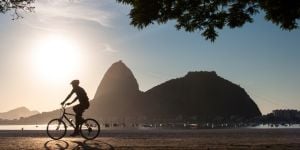08/10/21
Welcome, Hum@n,
A lot to unpack here! Let's start at the beginning.
First, let me second Texanbrazil's and Inubia's advice: take it slow, with visits and increasing familiarity, before you jump in with both feet. This is particularly true if you want to live in the interior, which you say you do. In Brazilian parlance, "interior" means anywhere outside a state capital, all the more so in a remote, very rural state like Amapá.
Foreigners can't just come to Brazil and stay "for a few years". Unless you qualify for a visa type (generally in the VITEM series) that permits a path to residency, you're limited to a tourist visa, VIVIS -- the electronic version now available to US Citizens operates under the same rules. This permits you 90 days in Brazil, with the possibility of extending for an additional 90 days, with a maximum of 180 days in every 365 -- that's it. See this list of visa types from the site of the Brazilian Consulate General in Chicago, to see whether you qualify for another type of visa:
http://chicago.itamaraty.gov.br/en-us/types_of_visa.xml
How's your Portuguese? Brazil is the most completely monolingual country that I know, so any Portuguese you can acquire before you come is a very good idea. In the interior of Amapá, English will be useless, the value of any Spanish you speak will be marginal, resources to learn Portuguese locally will be extremely limited, and while it looks on the map like Amapá is cheek-by-jowl with French Guiana, the nearest French-speaking community is on the other side of hundreds of miles of rainforest.
You and your kids should be perfectly safe. Fairhaired, blue eyed people are more likely to be treated as local celebrities in interior northern and northeastern Brazil than anything else; you may come to dislike the attention, but it will generally be friendly. And it will be a good reminder that foreigners are always very visible in Brazil, which a good thing not to forget.
You're practically ON the Equator, so sunscreen is a must, everywhere, every day. The sun is incredibly powerful to anyone from the higher latitudes.
"Can we rely on local law enforcement?" To do what? Where you're thinking of going, there's very little crime, especially violent crime, but very little law enforcement, either. It wouldn't hurt to visit the local police station to introduce yourselves, if you'll be there a while. They will probably have noticed you on arrival, but that would make your presence "official" to them. They would also know you, and knowing a person goes a long way in Brazil.
"Many of the modern conveniences" may be hard to come by in Porto Grande. At least some of the principal Brazilian Internet companies appear to be represented there. One of your exploratory trips should include visits to their offices to find out which neighborhoods they serve, which will probably guide your househunting. Finding out where cell reception is good is another need-to-know. A house with indoor plumbing should be easy enough to find. Whether the water is municipal or from a well, it will probably be good enough for washing and cooking at boiling temperatures. You'll want bottled water for drinking and sub-boiling uses, like coffeemakers, though. The 5 gal/20 l bottle is ubiquitous throughout Brazil for this.
Whole-house air conditioning is rare in Northern Brazil, and would be extremely expensive, given energy prices. Most people up to and including the upper middle class make do with AC in the bedrooms at night, and open windows during the day, weather permitting. I live in Manaus, far from Amapá but still in Amazonia, with a similar climate. I love it -- it's Summer all the time. If you look at the temperatures for Porto Grande, you'll see that it's like twelve months of July for anyone accustomed to the northern US.
Environmental hazards. You and your wife should have your yellow fever and hepatitis A and B vaccinations, and tetanus boosters would be a good idea. You should talk to your pediatrician about your children and tropical diseases, and whether they should have tetanus boosters, as well. Talk to the locals about the prevalence of malaria and dengue, and take the precautions that they do. Have good health insurance that can be used in Brazil.
Importing a car into Brazil is an expensive, time-consuming task; much better to buy something here. If you go to AAA to get an International Driver's License, be sure to confirm that it's good in Brazil. When I did it, Brazil recognized the Interamerican, but not the International License; that may have changed, however.
I've stayed away from the money question, because it's so dependent on the standard of living that you plan to maintain. For a family of four, I can see $50K keeping you in acceptable comfort for about two years, tops, probably less, since you'll need a car. But that can vary so widely that it's no better than a guestimate.
Any follow-up questions, please post them. We're here to help. 
 Using phones in Brazil
Using phones in Brazil Accommodation in Brasilia
Accommodation in Brasilia Dating in Brazil
Dating in Brazil Leisure activities in Brazil
Leisure activities in Brazil Accommodation in Rio de Janeiro
Accommodation in Rio de Janeiro Marriage in Brazil
Marriage in Brazil Childcare in Brazil
Childcare in Brazil Driving in Brazil
Driving in Brazil



